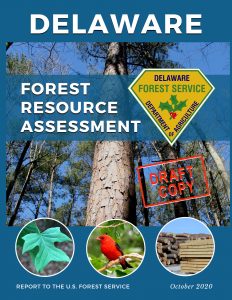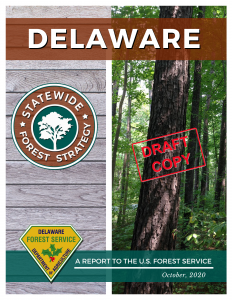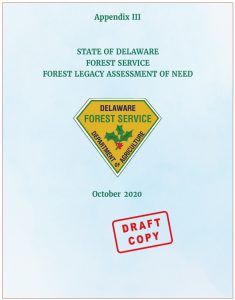Public comment sought for “Forest Action Plan”
Department of Agriculture | Forest Service | Kent County | New Castle County | Newsroom | Sussex County | Date Posted: Monday, August 3, 2020
Department of Agriculture | Forest Service | Kent County | New Castle County | Newsroom | Sussex County | Date Posted: Monday, August 3, 2020

DOVER, Del. — The Delaware Forest Service is seeking public comment on its new 2020 “Forest Action Plan,” comprised of an updated Delaware Forest Resource Assessment, Delaware Statewide Forest Strategy, and a new “Assessment of Need” for the U.S. Forest Legacy Program, which provides funding to conserve working forests. The documents can be found at de.gov/forestactionplan and are available in both Flipbook versions and PDF format. The public is kindly asked to review and provide comments via email at delawareforests@gmail.com by Friday, September 4, 2020.
Delaware’s Forest Action Plan consists of two major documents: a comprehensive forest resource assessment and a statewide forest strategy. The plan is submitted to the U.S. Forest Service every ten years as part of an extensive process that involves staff, governmental partners at all levels, and important stakeholders including private landowners, industry groups, nonprofits, natural resource agencies, and the general public. In addition, the Delaware Forest Service is using the process to update its Forest Legacy “Assessment of Need,” which proposes a formal expansion of Delaware’s Forest Legacy Areas to include new areas in the state while building on partnerships with non-governmental organizations to provide resources and funding to conserve working forests.
 A draft copy of the 2020 Delaware Forest Resource Assessment (in flip book format) is now available for public input and review. It marks a 10-year update of the 2010 Delaware Forest Resource Assessment. It follows the same seven criteria and eighteen indicators as outlined in the Montréal Process and adopted by the Northeast-Midwest State Foresters Alliance. All aspects, both biological and social, of forests and their sound management are addressed. These include biological diversity, productive capacity, forest health, soil and water resources, carbon cycles, social aspects, and legal and economic issues. Each criterion is supported by at least one corresponding indicator.
A draft copy of the 2020 Delaware Forest Resource Assessment (in flip book format) is now available for public input and review. It marks a 10-year update of the 2010 Delaware Forest Resource Assessment. It follows the same seven criteria and eighteen indicators as outlined in the Montréal Process and adopted by the Northeast-Midwest State Foresters Alliance. All aspects, both biological and social, of forests and their sound management are addressed. These include biological diversity, productive capacity, forest health, soil and water resources, carbon cycles, social aspects, and legal and economic issues. Each criterion is supported by at least one corresponding indicator.
Link to 2020 Delaware Forest Resource Assessment draft copy (PDF version)
Link to 2020 Delaware Forest Resource Assessment draft copy (Flipbook version)
Th e 2020 Delaware Statewide Forest Strategy includes performance goals and action items that when enacted will help ensure the health of urban and rural forests for years to come. The assessment was completed under the guidance of the Delaware Forest Stewardship Committee and with input from many other stakeholders. It identifies the most current priority issues, threats, and opportunities regarding Delaware’s forest resource. Additionally, priority urban and rural landscapes were identified in the assessment. A summary of the resource assessment is presented below but the entire document is available at this link.
e 2020 Delaware Statewide Forest Strategy includes performance goals and action items that when enacted will help ensure the health of urban and rural forests for years to come. The assessment was completed under the guidance of the Delaware Forest Stewardship Committee and with input from many other stakeholders. It identifies the most current priority issues, threats, and opportunities regarding Delaware’s forest resource. Additionally, priority urban and rural landscapes were identified in the assessment. A summary of the resource assessment is presented below but the entire document is available at this link.
The DFS worked closely with a variety of stakeholders and conservation-minded organizations and concluded that the four overriding state issues developed for the 2010 Delaware Forest Action Plan were still relevant today. The corresponding 19 comprehensive, long-term strategies were also retained but modified and updated where necessary and three new strategies were added. Each strategy contains multiple action items with performance goals to measure success. All previous 78 action items were also reviewed and updated. Participants in the review process made suggestions for additional performance goals related to the updated forest resource assessment. Twenty-seven new performance goals are included in this update. These were incorporated into the final strategy as well. Many of the action items will require years, if not decades, to achieve and also require partnering with one or more public and/or private organizations to accomplish. Nonetheless, we believe this updated strategy document is an excellent guide for the DFS to focus limited resources on the key issues facing Delaware’s forests.
Link to 2020 Delaware Statewide Forest Strategy draft copy (PDF version)
Link to 2020 Delaware Statewide Forest Strategy (draft copy) (Flipbook version)
 The Forest Legacy Program is funded through the U.S. Forest Service’s State and Private Forestry (S&PF) budget. It provides funds to states to protect working forestlands that are threatened by development or other land uses, either through outright (fee simple) purchase or conservation easements. A conservation easement allows the landowner to continue to own the forest; however, the easement prohibits non-forest uses such as development. Landowners who chose to sell an easement must also have a forest stewardship plan for their property that describes the activities needed to help achieve their objectives for the property; the Delaware Forest Service can write this plan with the landowner. The intent of FLP is to ensure forestlands continue to yield the forest products we use everyday, such as timber, wildlife habitat, and water quality protection. Landowner participation in FLP is completely voluntary.
The Forest Legacy Program is funded through the U.S. Forest Service’s State and Private Forestry (S&PF) budget. It provides funds to states to protect working forestlands that are threatened by development or other land uses, either through outright (fee simple) purchase or conservation easements. A conservation easement allows the landowner to continue to own the forest; however, the easement prohibits non-forest uses such as development. Landowners who chose to sell an easement must also have a forest stewardship plan for their property that describes the activities needed to help achieve their objectives for the property; the Delaware Forest Service can write this plan with the landowner. The intent of FLP is to ensure forestlands continue to yield the forest products we use everyday, such as timber, wildlife habitat, and water quality protection. Landowner participation in FLP is completely voluntary.
As part of its 10-year update to its Delaware Forest Resource Assessment and Delaware Statewide Forest Strategy, Delaware is updating its Forest Legacy Program (FLP) “Assessment of Need” (AON) to include new areas in the First State to target to receive potential funding from the Forest Legacy Program. In addition to current Forest Legacy Areas: White Clay Creek, Blackbird/Blackiston, Redden/Ellendale, Cypress Swamp. The new proposed areas for inclusion in the AON are: Milford Neck, Marshyhope, Central Sussex, Nanticoke, Southwest Sussex, and, the Redden/Ellendale Expansion. This update to the AON requires formal approval from the State Stewardship Committee.
States may only use Forest Legacy funds in areas designated in their Assessment of Need (AON) – the AON describes the state’s forests, the threats to the forests, and those areas within the state that contain the most important forests, which are called the Forest Legacy Areas. Once the Secretary of the United States Department of Agriculture (USDA) approves the AON, the state is eligible to receive Legacy funds to purchase land and easements within the designated Forest Legacy areas.
Delaware’s AON was approved in December 1998, and there are four Legacy areas in Delaware – White Clay Creek, Blackbird/Blackiston, Redden/Ellendale, and Cypress Swamp (see maps below). These areas contain the highest concentrations of forests in Delaware, including significant acreage already protected through public and private ownership.
Keep up to date by receiving a daily digest email, around noon, of current news release posts from state agencies on news.delaware.gov.
Here you can subscribe to future news updates.
Department of Agriculture | Forest Service | Kent County | New Castle County | Newsroom | Sussex County | Date Posted: Monday, August 3, 2020

DOVER, Del. — The Delaware Forest Service is seeking public comment on its new 2020 “Forest Action Plan,” comprised of an updated Delaware Forest Resource Assessment, Delaware Statewide Forest Strategy, and a new “Assessment of Need” for the U.S. Forest Legacy Program, which provides funding to conserve working forests. The documents can be found at de.gov/forestactionplan and are available in both Flipbook versions and PDF format. The public is kindly asked to review and provide comments via email at delawareforests@gmail.com by Friday, September 4, 2020.
Delaware’s Forest Action Plan consists of two major documents: a comprehensive forest resource assessment and a statewide forest strategy. The plan is submitted to the U.S. Forest Service every ten years as part of an extensive process that involves staff, governmental partners at all levels, and important stakeholders including private landowners, industry groups, nonprofits, natural resource agencies, and the general public. In addition, the Delaware Forest Service is using the process to update its Forest Legacy “Assessment of Need,” which proposes a formal expansion of Delaware’s Forest Legacy Areas to include new areas in the state while building on partnerships with non-governmental organizations to provide resources and funding to conserve working forests.
 A draft copy of the 2020 Delaware Forest Resource Assessment (in flip book format) is now available for public input and review. It marks a 10-year update of the 2010 Delaware Forest Resource Assessment. It follows the same seven criteria and eighteen indicators as outlined in the Montréal Process and adopted by the Northeast-Midwest State Foresters Alliance. All aspects, both biological and social, of forests and their sound management are addressed. These include biological diversity, productive capacity, forest health, soil and water resources, carbon cycles, social aspects, and legal and economic issues. Each criterion is supported by at least one corresponding indicator.
A draft copy of the 2020 Delaware Forest Resource Assessment (in flip book format) is now available for public input and review. It marks a 10-year update of the 2010 Delaware Forest Resource Assessment. It follows the same seven criteria and eighteen indicators as outlined in the Montréal Process and adopted by the Northeast-Midwest State Foresters Alliance. All aspects, both biological and social, of forests and their sound management are addressed. These include biological diversity, productive capacity, forest health, soil and water resources, carbon cycles, social aspects, and legal and economic issues. Each criterion is supported by at least one corresponding indicator.
Link to 2020 Delaware Forest Resource Assessment draft copy (PDF version)
Link to 2020 Delaware Forest Resource Assessment draft copy (Flipbook version)
Th e 2020 Delaware Statewide Forest Strategy includes performance goals and action items that when enacted will help ensure the health of urban and rural forests for years to come. The assessment was completed under the guidance of the Delaware Forest Stewardship Committee and with input from many other stakeholders. It identifies the most current priority issues, threats, and opportunities regarding Delaware’s forest resource. Additionally, priority urban and rural landscapes were identified in the assessment. A summary of the resource assessment is presented below but the entire document is available at this link.
e 2020 Delaware Statewide Forest Strategy includes performance goals and action items that when enacted will help ensure the health of urban and rural forests for years to come. The assessment was completed under the guidance of the Delaware Forest Stewardship Committee and with input from many other stakeholders. It identifies the most current priority issues, threats, and opportunities regarding Delaware’s forest resource. Additionally, priority urban and rural landscapes were identified in the assessment. A summary of the resource assessment is presented below but the entire document is available at this link.
The DFS worked closely with a variety of stakeholders and conservation-minded organizations and concluded that the four overriding state issues developed for the 2010 Delaware Forest Action Plan were still relevant today. The corresponding 19 comprehensive, long-term strategies were also retained but modified and updated where necessary and three new strategies were added. Each strategy contains multiple action items with performance goals to measure success. All previous 78 action items were also reviewed and updated. Participants in the review process made suggestions for additional performance goals related to the updated forest resource assessment. Twenty-seven new performance goals are included in this update. These were incorporated into the final strategy as well. Many of the action items will require years, if not decades, to achieve and also require partnering with one or more public and/or private organizations to accomplish. Nonetheless, we believe this updated strategy document is an excellent guide for the DFS to focus limited resources on the key issues facing Delaware’s forests.
Link to 2020 Delaware Statewide Forest Strategy draft copy (PDF version)
Link to 2020 Delaware Statewide Forest Strategy (draft copy) (Flipbook version)
 The Forest Legacy Program is funded through the U.S. Forest Service’s State and Private Forestry (S&PF) budget. It provides funds to states to protect working forestlands that are threatened by development or other land uses, either through outright (fee simple) purchase or conservation easements. A conservation easement allows the landowner to continue to own the forest; however, the easement prohibits non-forest uses such as development. Landowners who chose to sell an easement must also have a forest stewardship plan for their property that describes the activities needed to help achieve their objectives for the property; the Delaware Forest Service can write this plan with the landowner. The intent of FLP is to ensure forestlands continue to yield the forest products we use everyday, such as timber, wildlife habitat, and water quality protection. Landowner participation in FLP is completely voluntary.
The Forest Legacy Program is funded through the U.S. Forest Service’s State and Private Forestry (S&PF) budget. It provides funds to states to protect working forestlands that are threatened by development or other land uses, either through outright (fee simple) purchase or conservation easements. A conservation easement allows the landowner to continue to own the forest; however, the easement prohibits non-forest uses such as development. Landowners who chose to sell an easement must also have a forest stewardship plan for their property that describes the activities needed to help achieve their objectives for the property; the Delaware Forest Service can write this plan with the landowner. The intent of FLP is to ensure forestlands continue to yield the forest products we use everyday, such as timber, wildlife habitat, and water quality protection. Landowner participation in FLP is completely voluntary.
As part of its 10-year update to its Delaware Forest Resource Assessment and Delaware Statewide Forest Strategy, Delaware is updating its Forest Legacy Program (FLP) “Assessment of Need” (AON) to include new areas in the First State to target to receive potential funding from the Forest Legacy Program. In addition to current Forest Legacy Areas: White Clay Creek, Blackbird/Blackiston, Redden/Ellendale, Cypress Swamp. The new proposed areas for inclusion in the AON are: Milford Neck, Marshyhope, Central Sussex, Nanticoke, Southwest Sussex, and, the Redden/Ellendale Expansion. This update to the AON requires formal approval from the State Stewardship Committee.
States may only use Forest Legacy funds in areas designated in their Assessment of Need (AON) – the AON describes the state’s forests, the threats to the forests, and those areas within the state that contain the most important forests, which are called the Forest Legacy Areas. Once the Secretary of the United States Department of Agriculture (USDA) approves the AON, the state is eligible to receive Legacy funds to purchase land and easements within the designated Forest Legacy areas.
Delaware’s AON was approved in December 1998, and there are four Legacy areas in Delaware – White Clay Creek, Blackbird/Blackiston, Redden/Ellendale, and Cypress Swamp (see maps below). These areas contain the highest concentrations of forests in Delaware, including significant acreage already protected through public and private ownership.
Keep up to date by receiving a daily digest email, around noon, of current news release posts from state agencies on news.delaware.gov.
Here you can subscribe to future news updates.